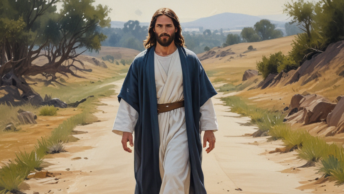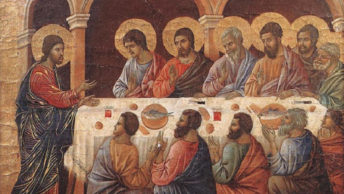On this 13th Sunday in Ordinary Time, our Gospel passage and second reading have a few powerful sentences with which we are familiar, yet they might have lost their edge precisely because we heard them so many times before. Hence, by now, they might be unable to penetrate the thick layer of spiritual insensitivity that, perhaps, we have built up around our minds and hearts.
Whoever does not take up his cross and follow after me is not worthy of me. (Matthew 10:38)
Whoever finds his life will lose it, and whoever loses his life for my sake will find it. (Matthew 10:39)
You must think of yourselves as dead to sin and living for God in Christ Jesus. (Romans 6:11)
These three might be the most forceful ones of the whole set of readings. They are sufficient to force us to realize that the cost of discipleship is high indeed. God is challenging us to toss aside any simplistic illusion that Christianity can be for us a simple question of culture, tradition, good habits like attending Mass most Sundays, First Communions, Confirmations, church weddings and funerals. Nor is discipleship a garment that we wear to church on Sunday and that we shed for the rest of the week when we are all taken by the many demands of life in a competitive and mostly heartless world.
Before we consider the impact that God wants those statements to make in our life, let me point out to you an easily missed fact: These words that deal directly with life and death, eternal life, or eternal death, with the need to carry our cross and the prospect of self-immolation, are spoken in a timeless fashion by Christ, the risen Lord, present among us, his Church, till the end of the ages.
Jesus, physically present for about three of the 33 years of his earthly life in Palestine, most likely could not have spoken them with the precision and shocking impact that we find in them now.
Why? You might ask. Well, because if Jesus had mentioned the cross before he was nailed to one and rose victorious from it, he would have gotten a blank stare of bewilderment from his first disciples.
It is the risen Lord, speaking through the readings of the New Testament and, for us, through our Pope, bishops, priests, and deacons who desires to create in us a tremendous impact with his words about dying to sin, about taking up our cross, about “finding life” in self-immolation for the sake of others.
To prove it, let me quote: Whoever receives you receives me and whoever receives me receives the one who sent me. (Matthew 10:40)
Elsewhere Jesus said about his apostles: Whoever listens to you listens to me. Whoever rejects you rejects me. And whoever rejects me rejects the one who sent me.” (Luke 10:16)
Thus, the point which must be made is as follows: throughout the life of the Church, throughout each generation of Christ’s disciples, we included, these words of the risen Lord must be guiding and challenging everyone who wishes to be worthy of him. It is so because, in every age, especially in ours I would say, some potential disciples of Christ do not push themselves past the folkloristic, cultural, occasional display of discipleship. They deem sufficient and safely adequate for eternal life, those religious actions and rituals that allow them to pursuit much of what the world has to offer even if what the world has to offer is not consistent with the Gospel. They do not even suspect that, week after week, save for the hour spent in here on a Saturday evening or on a Sunday morning, they are “finding life” according to the way approved and encouraged by the world and, therefore, are “losing” it according to the challenging standards of the Gospel.
I realize that what I have been saying here is kind of hazy. So, let me make it simpler. Basically, the world encourages people to ‘find life” by finding ways to increase their possessions, pleasures, and power. By “possessions” I refer to all those nice things that we might want for ourselves as potential sources of happiness, without even a passing thought to the fact that just a mere fraction of the world population might have access to them. By “pleasures” I point to all those comforts in which one might want to indulge to make life so much more enjoyable. And by “power” I indicate all that the world’s history has recorded as examples of dominance, manipulation, exploitation, and control over the weak and the powerless. But we must also include the power which is subtle and allows its seekers to be less dependent or even completely independent of others and, ultimately, of God himself.
Jesus, on the other hand, challenges us by asking us to turn the pursuit of possessions, pleasure, and power on its head, to lose all of them in union with him, to find life by embracing the philosophy of the cross.
It quickly becomes evident that the cost of discipleship is very high indeed. And, since it goes against our natural tendencies wounded by original sin, there must be a frequent confrontation with the pages of the Gospel in which Jesus contraposes his way over the world’s way. The examples offered by Jesus, here, give us a taste of the radical philosophy of the cross: we are to die to our self by loving him over the strongest family ties; by daring to consider the unsettling message of a prophet sent by the Lord to chase us out of our comfort zone; by silencing our ego enough to recognize the righteousness of those who are much better than we are; and by attending to the simplest needs of the littlest ones who will be unable to pay us back.
Given the scary uniqueness of the philosophy of the cross, those who decide to be his disciples need to be nourished as often as possible by the Flesh and Blood of their Lord. This is necessary so that, going against the way of the world, they might become gradually more and more willing to die to themselves to love and to serve others the way the Lord Jesus loves and serves them on the cross. Or, to put it the way St. Paul puts it: we will become worthy of Christ’s discipleship if we think of ourselves as dead to sin and living for God in Christ Jesus. (Romans 6:11)
It is decision time for us all because, without delay, without hesitation, we ought to choose Jesus’ way over the world’s ways.








